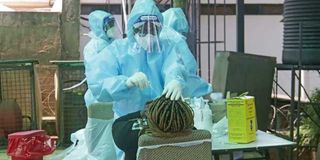The only way to stop Covid-19 social stigma

What you need to know:
- Stigma, psychologists say, comes about when something is not clearly understood, and if you don’t understand it and how it works, you fear it, and once you fear it, you reject it.
- The disease is also demystified when relatives of those who succumb to the virus do not hide the cause of death, as was the case when comedian Charles Bukeko passed away a few days ago.
Stigma. We’ve been hearing this word a lot since Covid-19 settled in our backyard. It’s a word that we used to hear a lot when HIV came along it, a word that lingered for many years because it took us a long time to finally understand the disease and eventually believe that we could not contract it by touching someone that had it or drinking from the same cup. And that’s when the stigma began to die.
Stigma, psychologists say, comes about when something is not clearly understood, and if you don’t understand it and how it works, you fear it, and once you fear it, you reject it. I guess this is what is happening with Covid-19.
There have been horrifying accounts of how people who have contracted the disease, or those suspected of having it, have been treated. In Nakuru County, for instance, neighbours burnt a business premises of a woman they falsely accused of spreading Covid-19.
Prior to this, the woman, a snail farmer, had been admitted to hospital after she started vomiting and developed a sore throat. That she had been whisked to hospital in an ambulance removed any shadow her neighbours had that she had Covid-19.
When she was discharged from hospital two days later after being given a clean bill of health, her neighbours decided that the snails she kept would spread the virus in the community, and burnt the snail shelter down.
TESTED POSITIVE
Her sole source of livelihood gone due to ignorance about a disease. There are many other stories like this one, including that of a nurse who was ostracised by neighbours because she looked after patients who had tested positive for Covid-19. She was shunned for doing her job.
The only way to get rid of this kind of damaging stigma, drawing from what happened with HIV, is for people with Covid-19 or those who have been affected by it to publicly speak about it.
The educational messages by the Ministry of Health regarding the disease and how it spreads are not enough, just like it happened with HIV. People need to openly talk about it, discuss it in detail because this is the only way to demystify this disease that many are, understandably, terrified of.
With HIV, it began with people such as Joe Muriuki, who was the first Kenyan to go public with his status, and tireless advocates such as Asunta Wagura, who gave the virus a human face and encouraged other HIV-positive Kenyans, especially women, to go public with the virus. The stigma surrounding HIV is now as good as gone.
It is therefore encouraging to see some Kenyans going public with their Covid-19 status, for instance media personality Jeff Koinange, who announced a few days ago that he had tested positive for the virus.
Besides helping to banish the stigma, this could go a long way in converting the doubting Thomases that still believe Covid-19 is a hoax because they do not personally know anyone who has it or has died of it.
The disease is also demystified when relatives of those who succumb to the virus do not hide the cause of death, as was the case when comedian Charles Bukeko passed away a few days ago.
When we acknowledge that no one, including you, is immune to this disease, those who contract it and recover can be assured of returning home to a community that is welcoming and supportive, rather than a hostile and suspicious one.
The writer is Editor, Society & Magazines, Daily Nation [email protected]





